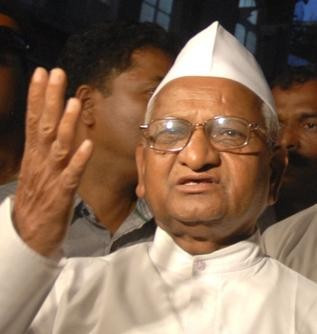Anna Hazare’s Arrest Set to Hurt the Indian Government

The Indian police have arrested anti-corruption campaigner and Mahatma Gandhi disciple Anna Hazare for pledging to go ahead with a hunger strike against a proposed new anti-corruption law.
After nine meetings with the government, Hazare and his supporters came up with their own version of the Lokpal (Citizen's Ombudsman) bill, which they say should be made into law.
The government however insist on passing its own anti-corruption bill, which they say contains 34 of the 40 principles of Hazare-led bill in the proposed anti-corruption law which is now being studied by a parliamentary committee.
Hazare and his civil society representatives complain that the law should be tougher and denounce the fact that the moment the Prime Minister and most government officials are excluded from investigation.
Surprisingly, after Hazare revealed his intention to start an indefinite fast in a park located central Delhi, authorities decided to impose 22 conditions.
Hazare however rejected six of the conditions including limiting the number of participants and vehicles at the site and time of the protest among other things and vowed to defy the ban.
When he started his fast this morning and threatened to "fast to the death" in protest over widespread government corruption, Hazare, along with more than 1,000 of his supporters ended up being detained by the police after authorities said he had been denied permission for the rally.
Hazare's move angered the authorities who claimed the arrest action was necessary to prevent a breakdown in law and order and Finance minister Pranab Mukherjee appeared on television claiming the controversial arrest is legal and justified.
"It is a legitimate right of the people of India to protest but at the same time there are certain rules and if the police feel that these actions could lead to law and order problems then they can bring in restrictions.
"Nobody is stifling the voice of the protestors but there is a method to this," the minister said.
Mr Hazare, 74, is known to be an important figure of the fight against corruption in India, and ended a hunger strike after four days in April after the government agreed to implement some reforms.
The arrest came as just a few days ago, India's president Pratibha Patil made a speech, in which she vowed to fight what she called corruption "cancer."
"There cannot be just one panacea or remedy to deal with it, but a system of transparency and accountability should be put in place at various levels, and then, effectively enforced. It would require preventive and punitive measures, as well as adoption of rational approaches as we pursue the anti-corruption agenda," she said
Analysts now say that Hazare's movement is gaining momentum and could become a serious challenge to the government as people are becoming angrier at officials who they say participate in widespread corruption.
In the last year the country has also seen a rise in inflation which has made food much more expensive and increased popular discontent.
The political camp has also been hit by a series of scandals ranging from the Commonwealth Games contracts to bureaucratic scams, including the alleged mishandling of the distribution of telecoms licenses.
The arrest of Hazare however will not help the government as his supporters insist his democratic right to protest has been violated.
Others however, while acknowledging Hazare's achievement and criticising the state's response, fear that the polarisation of the anti-corruption debate between the authorities and Hazare's end up trivialising the real issues.
© Copyright IBTimes 2025. All rights reserved.





















